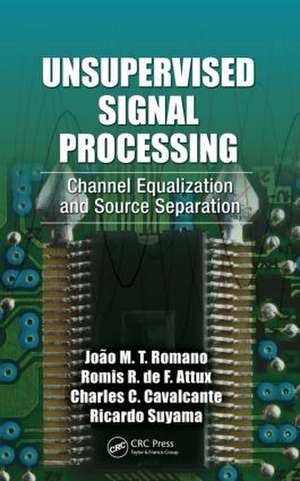Unsupervised Signal Processing: Channel Equalization and Source Separation
Autor João Marcos Travassos Romano, Romis Attux, Charles Casimiro Cavalcante, Ricardo Suyamaen Limba Engleză Hardback – 28 sep 2010
From the foundations of statistical and adaptive signal processing, the authors explore and elaborate on emerging tools, such as machine learning-based solutions and bio-inspired methods. With a fresh take on this exciting area of study, this book:
- Provides a solid background on the statistical characterization of signals and systems and on linear filtering theory
- Emphasizes the link between supervised and unsupervised processing from the perspective of linear prediction and constrained filtering theory
- Addresses key issues concerning equilibrium solutions and equivalence relationships in the context of unsupervised equalization criteria
- Provides a systematic presentation of source separation and independent component analysis
- Discusses some instigating connections between the filtering problem and computational intelligence approaches.
Preț: 963.56 lei
Preț vechi: 1393.17 lei
-31% Nou
Puncte Express: 1445
Preț estimativ în valută:
184.39€ • 191.42$ • 153.76£
184.39€ • 191.42$ • 153.76£
Comandă specială
Livrare economică 01-15 martie
Doresc să fiu notificat când acest titlu va fi disponibil:
Se trimite...
Preluare comenzi: 021 569.72.76
Specificații
ISBN-13: 9780849337512
ISBN-10: 0849337518
Pagini: 340
Ilustrații: 97 b/w images, 10 tables and 727 Equations
Dimensiuni: 156 x 234 x 25 mm
Greutate: 1.35 kg
Ediția:New.
Editura: CRC Press
Colecția CRC Press
ISBN-10: 0849337518
Pagini: 340
Ilustrații: 97 b/w images, 10 tables and 727 Equations
Dimensiuni: 156 x 234 x 25 mm
Greutate: 1.35 kg
Ediția:New.
Editura: CRC Press
Colecția CRC Press
Public țintă
ProfessionalCuprins
Introduction. Statistical Characterization of Signals and Systems. Linear Optimal and Adaptive Filtering. Unsupervised Channel Equalization. Unsupervised Multichannel Equalization. Blind Source Separation. Nonlinear Filtering and Machine Learning. Bio-Inspired Optimization Methods. Appendices.
Notă biografică
João Marcos Travassos Romano is a professor at the University of Campinas (UNICAMP), Campinas, Sao Paulo, Brazil. He received his BS and MS in electrical engineering from UNICAMP in 1981 and 1984, respectively. In 1987, he received his Ph.D from the University of Paris–XI, Orsay. He has been an invited professor at CNAM, Paris; at University of Paris–Descartes; and at ENS, Cachan. He is the coordinator of the DSPCom Laboratory at UNICAMP, and his research interests include adaptive filtering, unsupervised signal processing, and applications in communication systems.
Romis Ribeiro de Faissol Attux is an assistant professor at the University of Campinas (UNICAMP), Campinas, Sao Paulo, Brazil. He received his BS, MS, and Ph.D in electrical engineering from UNICAMP in 1999, 2001, and 2005, respectively. He is a researcher in the DSPCom Laboratory. His research interests include blind signal processing, independent component analysis (ICA), nonlinear adaptive filtering, information-theoretic learning, neural networks, bio-inspired computing, dynamical systems, and chaos.
Charles Casimiro Cavalcante is an assistant professor at the Federal University of Ceará (UFC), Fortaleza, Ceara, Brazil. He received his BSc and MSc in electrical engineering from UFC in 1999 and 2001, respectively, and his Ph.D from the University of Campinas, Campinas, Sao Paulo, Brazil, in 2004. He is a researcher in the Wireless Telecommunications Research Group (GTEL), where he leads research on signal processing for communications, blind source separation, wireless communications, and statistical signal processing.
Ricardo Suyama is an assistant professor at the Federal University of ABC (UFABC), Santo Andre, Sao Paulo, Brazil. He received his BS, MS, and Ph.D in electrical engineering from the University of Campinas, Campinas, Sao Paulo, Brazil in 2001, 2003, and 2007, respectively. He is a researcher in the DSPCom Laboratory at UNICAMP. His research interests include adaptive filtering, source separation, and applications in communication systems.
Romis Ribeiro de Faissol Attux is an assistant professor at the University of Campinas (UNICAMP), Campinas, Sao Paulo, Brazil. He received his BS, MS, and Ph.D in electrical engineering from UNICAMP in 1999, 2001, and 2005, respectively. He is a researcher in the DSPCom Laboratory. His research interests include blind signal processing, independent component analysis (ICA), nonlinear adaptive filtering, information-theoretic learning, neural networks, bio-inspired computing, dynamical systems, and chaos.
Charles Casimiro Cavalcante is an assistant professor at the Federal University of Ceará (UFC), Fortaleza, Ceara, Brazil. He received his BSc and MSc in electrical engineering from UFC in 1999 and 2001, respectively, and his Ph.D from the University of Campinas, Campinas, Sao Paulo, Brazil, in 2004. He is a researcher in the Wireless Telecommunications Research Group (GTEL), where he leads research on signal processing for communications, blind source separation, wireless communications, and statistical signal processing.
Ricardo Suyama is an assistant professor at the Federal University of ABC (UFABC), Santo Andre, Sao Paulo, Brazil. He received his BS, MS, and Ph.D in electrical engineering from the University of Campinas, Campinas, Sao Paulo, Brazil in 2001, 2003, and 2007, respectively. He is a researcher in the DSPCom Laboratory at UNICAMP. His research interests include adaptive filtering, source separation, and applications in communication systems.
Descriere
Unsupervised Signal Processing: Channel Equalization and Source Separation provides a unified and systematic presentation of topics such as blind equalization, source separation, and unsupervised as well as nonlinear adaptive filtering. Extending classical results in literature, this book addresses new issues on static and dynamic convergence of Bussgang algorithsm. It explores emergent trends like neuro-fuzzy systems and evolutionary algorithms. The text pays special attention to the equivalence relations between the different unsupervised criteria, including the relationships with Wiener theory. It also includes applications to wireless communications and MIMO systems.
